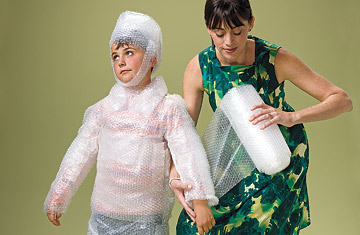
(2 of 8)
A backlash against overparenting had been building for years, but now it reflects a new reality. Since the onset of the Great Recession, according to a CBS News poll, a third of parents have cut their kids' extracurricular activities. They downsized, downshifted and simplified because they had to--and often found, much to their surprise, that they liked it. When a TIME poll last spring asked how the recession had affected people's relationships with their kids, nearly four times as many people said relationships had gotten better as said they'd gotten worse. "This is one of those moments when everything is on the table, up for grabs," says Carl Honoré, whose book Under Pressure: Rescuing Our Children from the Culture of Hyper-Parenting is a gospel of the slow-parenting movement. He likens the sudden awareness to the feeling you get when you wake up after a long night carousing, the lights go on, and you realize you're a mess. "That horrible moment of self-recognition is where we are culturally. I wanted parents to realize they are not alone in thinking this is insanity, and show there's another way."
How We Got Here
Overparenting had been around long before Douglas MacArthur's mom Pinky moved with him to West Point in 1899 and took an apartment near the campus, supposedly so she could watch him with a telescope to be sure he was studying. But in the 1990s something dramatic happened, and the needle went way past the red line. From peace and prosperity, there arose fear and anxiety; crime went down, yet parents stopped letting kids out of their sight; the percentage of kids walking or biking to school dropped from 41% in 1969 to 13% in 2001. Death by injury has dropped more than 50% since 1980, yet parents lobbied to take the jungle gyms out of playgrounds, and strollers suddenly needed the warning label REMOVE CHILD BEFORE FOLDING. Among 6-to-8-year-olds, free playtime dropped 25% from 1981 to '97, and homework more than doubled. Bookstores offered Brain Foods for Kids: Over 100 Recipes to Boost Your Child's Intelligence. The state of Georgia sent every newborn home with the CD Build Your Baby's Brain Through the Power of Music, after researchers claimed to have discovered that listening to Mozart could temporarily help raise IQ scores by as many as 9 points. By the time the frenzy had reached its peak, colleges were installing "Hi, Mom!" webcams in common areas, and employers like Ernst & Young were creating "parent packs" for recruits to give Mom and Dad, since they were involved in negotiating salary and benefits.
